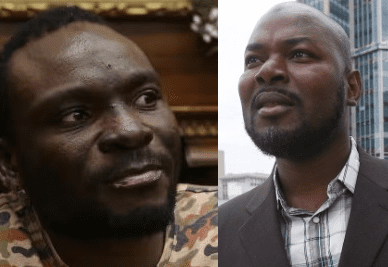Due to the current political climate in United States of America [U.S.A.], after the re-election of President Donald Trump, many Black coloured immigrants don’t feel safe in America.
Especially Islamic coloured immigrants mostly from Africa living in United States are supposed to open their claims for asylum and permanent residents there.
But since President Donald Trump has made it clear that he would arrest, prosecute, jail and deport most of these immigrants back to their home countries, most of them do not want to take chances and are now moving north and eventually crossing the Canada border illegally.
The Ministry of Public Safety of Canada has warned illegal immigrants against using the back door to enter the country illegally as it is dangerous to do considering the near death experiences they might suffer should they attempt.
You may have heard of two Ghanaian refugees Mr. Mohammed Seidu and Mr. Iyal Razak and their journey from Ghana, to Brazil, and to United States of America and eventually crossed the Canada border illegally.
Their story begins in Ghana, where the once promising football star Mohammed Seidu and Iyal Razak a businessman allegedly faced persecution for their sexual identity.
They made a trek from Ghana to Brazil, and then from there through Panama, Costa Rica, Nicaragua, Honduras, Guatemala, and Mexico, to eventually land in Canada.
During the journey, the pair were constantly robbed, threatened and faced hardships like dehydration, starvation, and language barriers.
When the two made it to the United States, they were detained and fined heavily. Eventually Mohammed made it to Ohio, where his brother was living and had a trial with Columbus Crew, a professional soccer team but failed to make the team.
Later on the pair in Minnesota-America embarked on a “deadly foot-slog” to Canada in a snow squall, suffered frostbite only saved by a good Samaritan truck driver.
Both men were under dressed and eventually they lost their fingers to frostbite as they did not research about Canada before they set foot from Grand Forks in Minnesota-America in a chilling weather to outside the city of Emerson in Winnipeg-Canada in December 24, 2026.
After walking for seven hours on that deadly snow squall night to just outside Emerson, they were found by a truck driver and rushed to a hospital in Morris.
Few weeks later, they were transferred to the Health Sciences Center in Winnipeg for further treatment and that is where they learn they were going to lose all their fingers.
“We want people to know how it is to be a refugee,” says Mohammed. “It wasn’t a choice, you are forced to be a refugee, and we’re talking about it so that we can convince people how hard it is. Sometimes we fled to various countries and came to seek a better life in a different country.”
Mohammed Siedu recounted his experience with the doctors. “I was traumatized. I didn’t expect it to happen to me and my friend. I was crying, asking myself, how can I work? How can I eat, how can I work without my fingers? The doctors were very helpful. They were telling me, oh[you] can still work. [You] can do a lot of things. Just that, like, you know, I am gonna lose all my fingers. And I didn’t take it easy. Crying and everything. I didn’t expect it to happen to me.”
Since then the pair have worked with doctors and scientists to develop tools that allow them to do things one might normally need fingers to do, such as use a computer and use their cell phones or even tie their shoe laces.
Looking back, Mohammed said, “Where you are not welcome, some country will welcome you.“ It is difficult to see your country not caring about you. “They” don’t care about your freedom and don’t care about human rights. But, the country that cares about human rights cares about freedom and cares about you is the country that you have to be in.”
Both men said, “We are not bad people. We came here as people with honor, with respect, and also to make the country grow as we are in it. We came here for a better life to take care of our families because our families back home don’t do anything because of what is in our home country, like war and corruption.”
“I will never pray for my enemy to go through what I did because I know what I went through, Mohammed said adding, “It is painful. It was a mistake that I made, but I don’t regret it anymore.”
Meanwhile, Mohammed’s life so far has made him more determined to give back to people around him from a position of leadership. After losing his fingers, he feared he might never fit into society again. However, he has only become stronger because of it.
Nobody can stop strong and energetic Ghanaian youth from seeking greener pastures in the United States of America [U.S.A] or Canada especially now that they claim life is expensive or hard to live in Ghana.
But we must take a critical look at the frustrations immigrants go through most often the near death experiences when they cross these countries borders illegally only to be terrorized by the security personnel to live in anxiety.
From Stephen Armah Quaye, Toronto-Canada.
- Military service commanders sworn into Armed Forces Council - 25 April 2025
- Finance Minister unveils plan to tackle 2024 payables - 25 April 2025
- 2 potential flagbearers donate GH¢3m and GH¢1m to NPP - 25 April 2025

